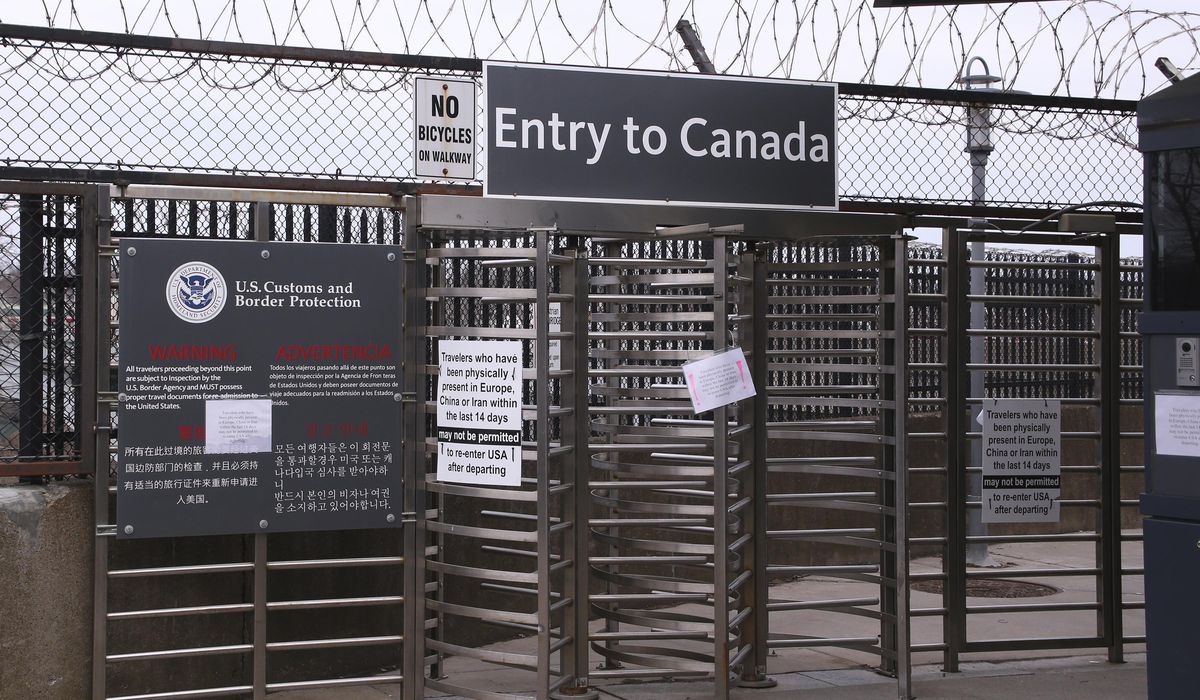
Canadian officials announced Friday the border with the U.S. will remain closed to non-essential travel for at least another month until more of their own residents are fully vaccinated against COVID-19.
South of the border, members of Congress with constituents near Canada reacted by calling out the governments in both Washington and Ottawa for failing to find an agreement to lift the travel restrictions.
“There’s no other way to say it: another month’s delay is bulls—t,” Rep. Brian Higgins, New York Democrat, said on social media Friday. Others, including some Republicans, called it “unacceptable.”
The border restrictions were put in place in March 2020 because of the novel coronavirus, effectively prohibiting most Americans and Canadians from crossing side unless conducting essential business.
Bill Blair, Canada‘s minister of public safety and emergency preparedness, said Friday the countries agreed to extend the restrictions until July 21, 16 months since the ban on non-essential travel began.
Canada plans on providing further details Monday on measures for fully vaccinated Canadians, permanent residents of the country and others currently permitted to enter, Mr. Blair said in a statement.
“We’re looking forward to getting back to normal as quickly as possible, but we’re not out of this pandemic yet,” Canadian Prime Minister Justin Trudeau said during a press conference later Friday.
“We’re still seeing cases across the country and we want to get them down,” said Mr. Trudeau. “At the same time, we also know we have to hit our targets of 75% vaccinated with the first dose and at least 20% vaccinated with the second dose before we can start loosening things up because even a fully vaccinated individual can pass on COVID-19 to someone who is not vaccinated.”
Sixty-four percent of the Canadian population has received at least one dose of a COVID-19 vaccine, according to the government there. Different vaccines require one or two doses depending on the type. Sixty-five of adults in the U.S. have received at least one dose of a COVID-19 vaccine, meanwhile, according to the Centers for Disease Control and Prevention. The White House set a goal of 70% by July 4.
“I get it, it’s frustrating for a whole bunch of people who just want to get back to normal,” said Mr. Trudeau. “But it’s really important that we continue as we have from the very beginning to keep Canadians safe.”
Mr. Higgins and Rep. Bill Huizenga, Michigan Republican, co-chairs of the Canada-U.S. Interparliamentary Group, said in a statement that millions of people on both sides of the border are being denied access to loved ones and property or being unable to conduct business as a result of the ban on non-essential travel. The countries share a land border of more than 5,500 miles in length, the longest in the world.
“While the arrival of vaccines in record time has been a modern marvel, the inability of the U.S. and Canadian governments to reach an agreement on alleviating border restrictions or aligning additional essential traveler classes is simply unacceptable,” the congressmen said in the statement.
Rep. Elise Stefanik of New York, the newly elected chairwoman of the Republican House Conference, accused President Biden of “caving” to Mr. Trudeau and his “incessant desire to delay,” meanwhile.
“I’ve called on the Biden Administration to begin taking unilateral steps towards easing restrictions for families and property owners, and the failure to do so is unacceptable for our northern border communities,” she said.







